Readings Newsletter
Become a Readings Member to make your shopping experience even easier.
Sign in or sign up for free!
You’re not far away from qualifying for FREE standard shipping within Australia
You’ve qualified for FREE standard shipping within Australia
The cart is loading…






A Culturally-Centered and Intersectional Approach to Reproductive Justice investigates and challenges assumptions and pre-existing notions regarding reproductive justice by grounding this work in a more inclusive and culturally informed context. Throughout history, contributors argue, reproductive justice movements have centered white, cisgendered, and non-disabled women in the West. Along with women in the Global South being underrepresented in scholarship, research tends to focus only on the abuses they have suffered, rather than delving deeper into issues of structures, barriers, or agency. Each chapter is written from an autoethnographic perspective to unpack the contributors' challenges with achieving reproductive justice for themselves and their respective communities. Ultimately, this book asserts that when different facets of reproductive justice are presented in the form of narrative self-reflexivity, readers find a space to safely evaluate their positionality within the larger reproductive justice movement while simultaneously acknowledging the complexity of the movement itself. Scholars of communication, health, and women's and gender studies will find this book of particular interest.
$9.00 standard shipping within Australia
FREE standard shipping within Australia for orders over $100.00
Express & International shipping calculated at checkout
A Culturally-Centered and Intersectional Approach to Reproductive Justice investigates and challenges assumptions and pre-existing notions regarding reproductive justice by grounding this work in a more inclusive and culturally informed context. Throughout history, contributors argue, reproductive justice movements have centered white, cisgendered, and non-disabled women in the West. Along with women in the Global South being underrepresented in scholarship, research tends to focus only on the abuses they have suffered, rather than delving deeper into issues of structures, barriers, or agency. Each chapter is written from an autoethnographic perspective to unpack the contributors' challenges with achieving reproductive justice for themselves and their respective communities. Ultimately, this book asserts that when different facets of reproductive justice are presented in the form of narrative self-reflexivity, readers find a space to safely evaluate their positionality within the larger reproductive justice movement while simultaneously acknowledging the complexity of the movement itself. Scholars of communication, health, and women's and gender studies will find this book of particular interest.